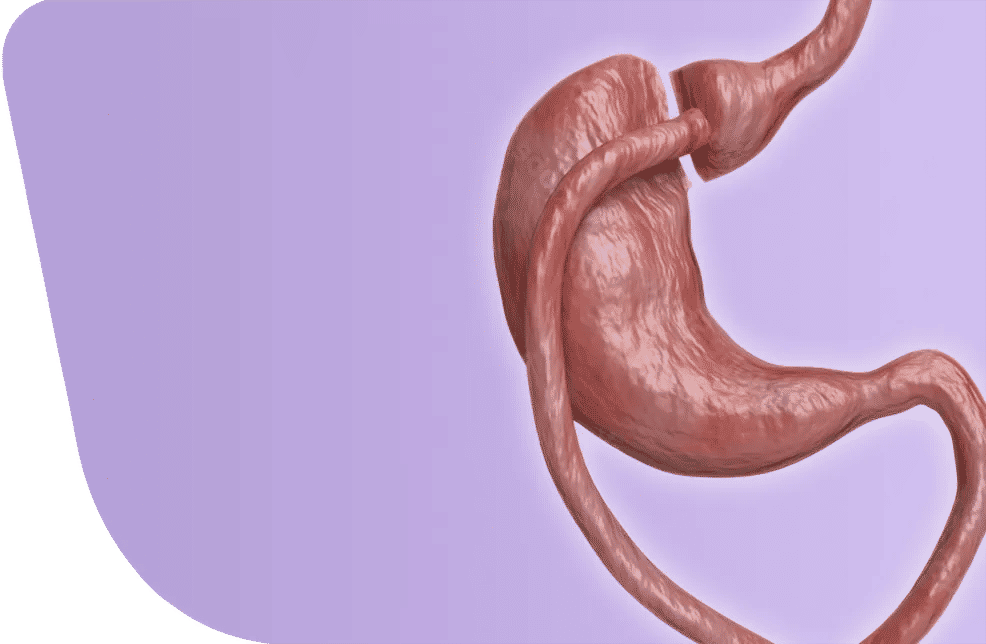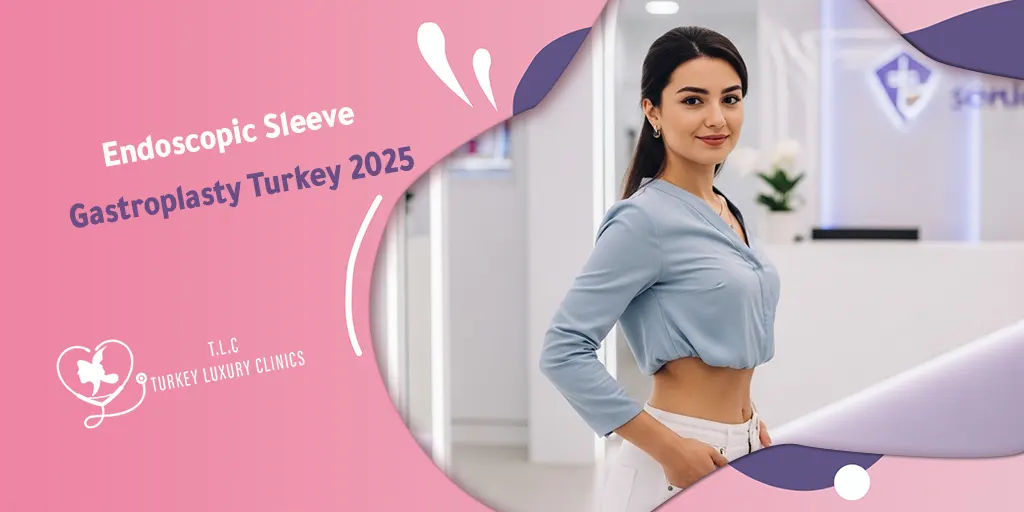- - Laparoscopic Gastric Sleeve Surgery in Turkey
- - Why Choose Turkey for the Laparoscopic Gastric Sleeve?
- - How Much is the Laparoscopic Gastric Sleeve in Turkey?
- - Is Gastric Sleeve Surgery Right for Me?
- - How is Laparoscopic Gastric Sleeve Surgery Performed?
- - What to Expect After Gastric Sleeve Surgery?
- - Laparoscopic Gastric Sleeve Results
- - Laparoscopic Gastric Sleeve Surgery Recovery Time
- - Laparoscopic Gastric Sleeve Complications and Risks
- - Laparoscopic Gastric Sleeve and Gastric Bypass vs. Gastric Bands
- - Start Your Gastric Sleeve Journey in Turkey Safely & Confidently
- - FAQs About Laparoscopic Gastric Sleeve Surgery in Turkey
Laparoscopic gastric sleeve surgery in Turkey, (also known as Gastric Sleeve or Vertical Sleeve Gastrectomy – VSG) has become increasingly popular thanks to its affordability, highly skilled surgeons, and state-of-the-art medical facilities.
With success rates of up to 95% and prices starting as low as $2,000, Turkey offers competitive costs without compromising on quality, making it a top destination for patients seeking safe and effective weight-loss surgery.
Ready to begin your transformation? Contact Turkey Luxury Clinics today for a personalized gastric sleeve package and world-class care at an affordable price.
Laparoscopic Gastric Sleeve Surgery in Turkey
laparoscopic gastric sleeve resection surgery is a minimally invasive weight-loss procedure that removes a large portion of the stomach, leaving a smaller, sleeve-shaped stomach. This significantly limits food intake and reduces the production of ghrelin—the hormone responsible for stimulating appetite.
It is one of the most effective treatments for obesity and related health conditions such as type 2 diabetes, sleep apnea, and heart disease. Multiple studies and clinical research confirm its long-term safety and efficacy.
According to a study published in the Journal of the American College of Cardiology (2022):
“Bariatric surgery is linked to a significant reduction in all-cause and cardiovascular mortality, as well as a decreased incidence of several cardiovascular diseases in obese patients. Therefore, it should be considered a treatment option for this population.”
Why Choose Turkey for the Laparoscopic Gastric Sleeve?
Looking for world-class bariatric care at a fraction of the cost? Turkey has become a leading destination for medical and cosmetic surgeries, offering highly qualified surgeons and a unique combination of quality, safety, and affordability all in one place.
- Turkey offers competitive prices for gastric sleeve surgery, which are much lower than those in the UK, USA, and other European countries.
- Turkey is home to highly skilled and experienced bariatric surgeons, many of whom have international training and specialize in treating patients from abroad.
- State-of-the-art Turkish clinics are accredited by the Ministry of Health and equipped with cutting-edge, modern medical technology.
- Many clinics offer all-inclusive packages that cover the surgery, accommodation, airport transfers, and post-operative care.
- Turkey is a popular destination for medical tourism, offering a combination of quality healthcare and travel opportunities.
How Much is the Laparoscopic Gastric Sleeve in Turkey?
The average cost of the laparoscopic gastric sleeve in Turkey is around $3,500.
- The minimum gastric sleeve cost starts from about $2,000,
- The maximum cost of gastric sleeve surgery can reach up to $6,000.
The cost of gastric sleeve depends on several factors, including the clinic, the surgeon’s experience, all inclusive package and advanced technologies, such as robotic-assisted gastric sleeve surgery.
- The price of a standard gastric sleeve is around $3,000,
- A robotic-assisted gastric sleeve costs $5,500.
The cost of laparoscopic gastric sleeve is reasonable compared to other bariatric procedures:
- The cost of Gastric Bypass in Turkey is $4,500 and $8,000.
- Gastric band surgery in Turkey costs $2,500–$4,000
Compared to these countries, the cost of a laparoscopic gastric sleeve in Turkey is significantly lower—without compromising on the quality of care, safety, or results.
- The cost of laparoscopic gastric sleeve in the United States varies by state and city. For example, laparoscopic gastric sleeve surgery Miami costs between $12,000 and $20,000.
- The cost of a laparoscopic gastric sleeve in the United Kingdom is around $11,000 to $15,000.
- The cost of a laparoscopic gastric sleeve in European countries is $8,500 to $13,000.
Get your personalized package now with Turkey Luxury Clinics’ expert surgeons, luxury care, and transparent pricing starting at $2,000. Contact us today for your free consultation!
Is Gastric Sleeve Surgery Right for Me?
Gastric sleeve surgery is generally suitable for people who struggle with severe obesity and haven’t achieved weight loss through diet and exercise. You may be a good candidates if you are:
- Patients with BMI 35 or more and failed to achieve weight loss by other approaches.
- Patients with BMI 60 or more should pass weight loss surgery in two distinct stages with the first one is LSG followed by gastric bypass surgery.
- Patients with high BMI 35 or more and have weight associated diseases like diabetes mellitus, sleep apnea or heart disease.
How is Laparoscopic Gastric Sleeve Surgery Performed?
Gastric sleeve surgery is a non-reversible procedure performed using a minimally invasive approach under general anesthesia in a hospital
The surgery is performed through small incisions in the abdomen, using a laparoscope and specialized instruments.
Here are steps of laparoscopic gastric sleeve:
- First, the anesthesiologist will give you general anesthesia so you won’t feel any pain during the surgery.
- The surgeon then makes 3–6 small incisions in your abdomen and inserts a laparoscope—a thin tube with a camera that guides the surgeon throughout the procedure.
- Using a surgical stapler, the stomach is divided vertically.
- A narrow sleeve-shaped stomach remains, while about 75% of the stomach is removed.
- The incisions are closed with sutures or surgical glue, and a temporary drain may be placed (usually removed within 1–2 days).
The entire laparoscopic sleeve gastrectomy usually takes about 2 to 4 hours, from the start of anesthesia until you wake up. Recovery begins immediately after surgery, with close monitoring in the recovery room.
For patients who prefer watching laparoscopic gastric sleeve surgery videos, there are many informative clips that show each step of the operation. This YouTube laparoscopic gastric sleeve surgery video clearly illustrates how the procedure is performed.
What to Expect After Gastric Sleeve Surgery?
After gastric sleeve laparoscopic surgery, expect a recovery phase that involves dietary changes, mild discomfort, and adjusting to smaller meals. This is followed by a period of significant weight loss and noticeable health benefits.
Laparoscopic Gastric Sleeve Results
Significant weight loss typically starts within the first few weeks and continues for 6–12 months.
Most patients lose 60–70% of their excess weight in the first year, with success rates reaching up to 95% when combined with proper diet and lifestyle changes.
Health benefits—such as improved diabetes management, blood pressure control, and sleep apnea treatment—often appear within months and continue to improve during the first year.
Wondering what happens years after gastric sleeve? discover 2 years and 10 years later after sleeve gastrectomy
Read more about: Factors That Affect Weight Loss After Gastric Sleeve
Laparoscopic Gastric Sleeve Surgery Recovery Time
Recovery after laparoscopic gastric sleeve starts as soon as you wake up from anesthesia. Most patients spend 1–2 days in the hospital and fully recover in a few weeks if they follow medical advice.
You will find all details about recovery period in Gastric Sleeve Recovery Time: What to Expect Day by Day
What to Expect During Recovery?
In the first hours after surgery, you may notice a small drainage tube near the incision site. This helps remove fluids and ensure there is no leakage.
In the next few days, you may feel mild to moderate pain and discomfort after surgery, but these symptoms are usually well-managed with medication.
Gentle movement is encouraged soon after to promote healing and prevent blood clots.
External incisions heal in about one week, while internal staples require several weeks to fully recover.
Diet After Gastric Sleeve Surgery
Your diet after gastric sleeve is critical for proper recovery and long-term success. For the first 2 days, only drink clear liquids. Then, gradually introduce pureed foods and soups until two weeks. read more about liquid diet during first 2 weeks.
Portion sizes should start as small as 2 tablespoons per meal, increasing gradually. Never overfill your stomach, as this can cause pain or affect staple healing.
Discover: can you get the gastric sleeve twice?
Laparoscopic Gastric Sleeve Complications and Risks
While the procedure is generally safe, there are potential gastric sleeve surgery complications from laparoscopic techniques, including early risks such as leaks, bleeding, or infection, and late risks like nutrient deficiencies or reflux.
Early complications occur during the first 30 days and include:
- Stomach fluids leaking from where the stomach was removed.
- Bleeding & infection
- Risks associated with anesthesia
- Blood clot forming in your leg and traveling to your lungs and heart
Late complications, developing over a longer period, can involve:
- Slow wound healing
- Nutrient deficiencies due to poor absorption
- Bowel blocking
- Narrowing of the inner diameter of the new stomach, called stomach stricture.
- Risk heartburn/reflux, and hiatal hernia
- Risk Weight regain.
Risks of complication with LSG is lower than that of gastric bypass surgery
According to a study published in 2025 in the Asian Journal of Surgery, the benefits of LSG and gastric bypass were similar; however, long‑term complications were found to be higher with bypass.
Empower your knowledge about Mental Health Challenges After Gastric Sleeve Surgery
Laparoscopic Gastric Sleeve and Gastric Bypass vs. Gastric Bands
Gastric Sleeve (also known as Laparoscopic Sleeve Gastrectomy – LSG or Vertical Sleeve Gastrectomy – VSG)
Removes about 80% of the stomach, leaving a small, sleeve-shaped stomach. It limits food intake and reduces hunger hormones. Permanent and highly effective for long-term weight loss.
Gastric Bypass (Roux-en-Y):
Creates a small stomach pouch and reroutes part of the small intestine, reducing both food intake and nutrient absorption. It offers rapid, significant weight loss but comes with higher complication risks.
Gastric Banding (LAP-BAND):
Place an adjustable silicone band around the upper stomach to create a small pouch. It’s reversible and less invasive but usually results in less weight loss compared to sleeve or bypass.
Discover: Gastric Sleeve vs Gastric Bypass and find which one is better for you
Start Your Gastric Sleeve Journey in Turkey Safely & Confidently
Get a personalized consultation with Turkey Luxury Clinics’ expert bariatric surgeons. Our specialists will assess your candidacy, explain all options, and guide you through every step of the process—so you can make an informed decision with confidence.
Trust our experienced medical team, including Dr. Gokman Ozturk, Dr. Hakan Seyit, and other top professionals, to deliver world-class care from start to finish.
FAQs About Laparoscopic Gastric Sleeve Surgery in Turkey
What is laparoscopic gastric sleeve surgery?
Laparoscopic sleeve gastrectomy is a surgical procedure to treat obesity. It involves removing a significant portion of the stomach, creating a smaller, sleeve-shaped stomach, which helps patients feel full with less food.
How long does laparoscopic gastric sleeve surgery take?
Laparoscopic sleeve gastrectomy usually takes about 60 to 90 minutes from the induction of anesthesia until the patient wakes up.














.webp)
.webp)
.webp)
.webp)

